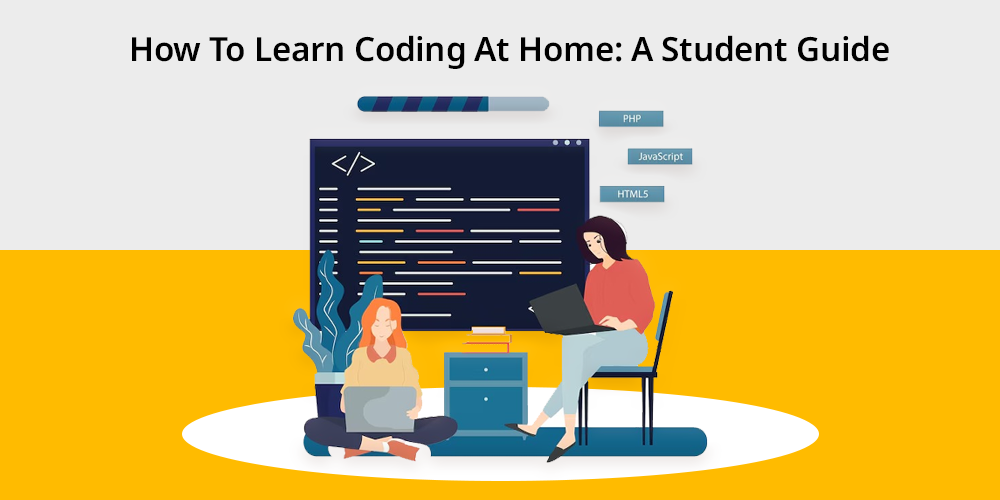
So, are you someone hearing a lot about coding lately and want to build a career in the same? It yes you may have question like:
“Can I actually learn coding from home?”
And the answer is YES. Whether you want to build a website, app or just want to understand how the tech around you actually works.
Everything you can do with the right knowledge. Learning code is the smartest approach to improve 21st century skills.
And now the best part is you don’t need to have any degree or take any course admissions.
This guide is made just for students like you who are motivated to learn but might not know exactly where to begin.
So, let’s explore. Before understanding how to learn coding at home, get into what is coding.
Contents
What is Coding?
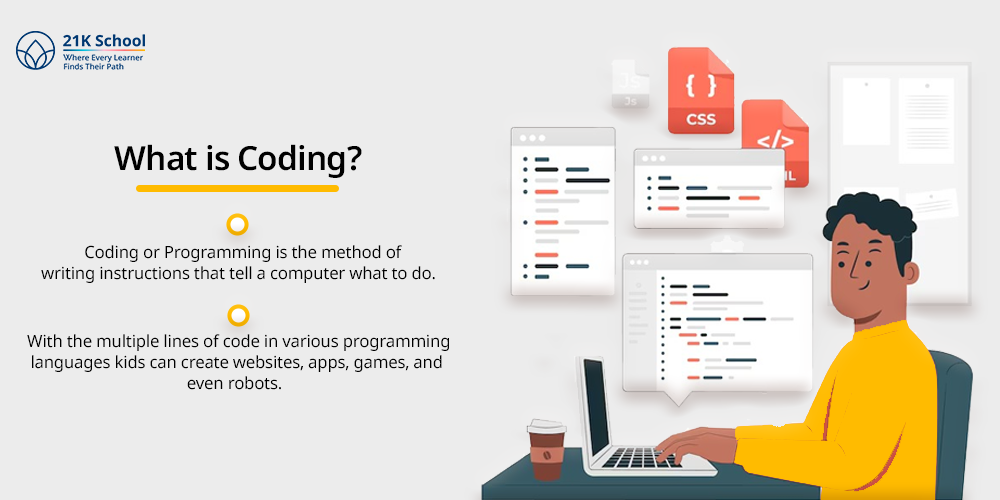
Coding or Programming is the method of writing instructions that tell a computer what to do.
With the multiple lines of code in various programming languages kids can create websites, apps, games, and even robots.
These codes are written in a way that a computer can understand, allowing it to perform tasks.
Platforms to Learn Coding at Home
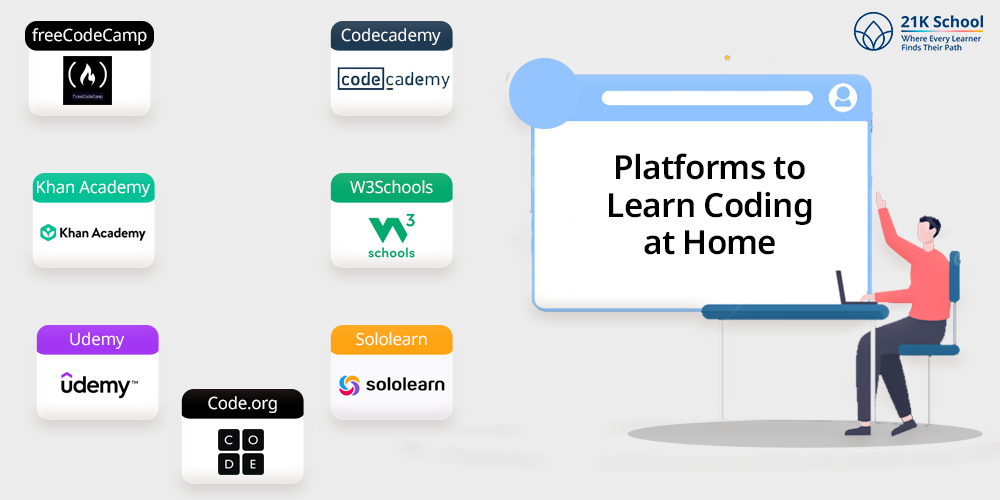
There are various best online platforms to learn coding at home. These platforms provide interactive tutorials, structured courses, and opportunities to practice coding skills.
Through these platforms attend various coding classes for kids from home. Let’s explore top 7 online platforms to learn coding at home:
1. freeCodeCamp
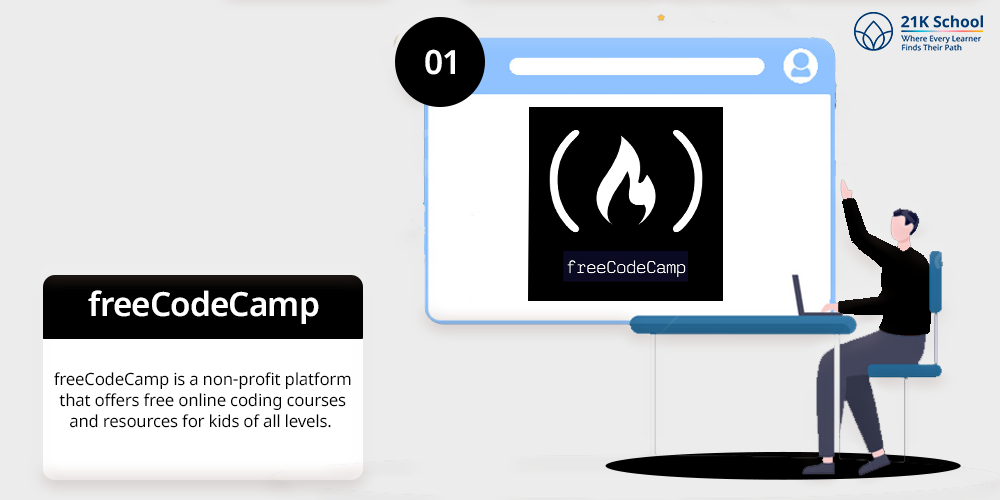
freeCodeCamp is a non-profit platform that offers free online coding courses and resources for kids of all levels.
freeCodeCamp interactive lessons and hands-on projects make learning intuitive. Students can get certifications as progress and their forums and community provide great support.
2. Codecademy
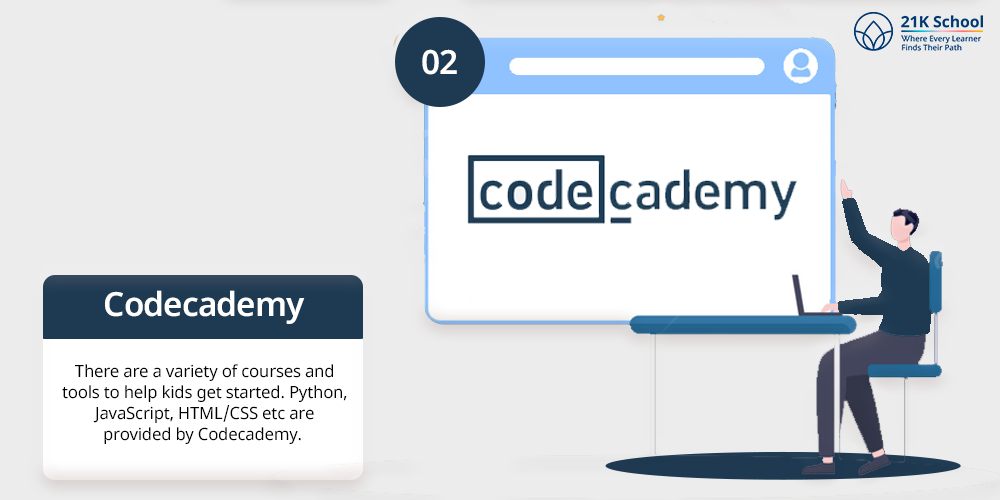
Codecademy is a famous online learning platform for coding. It allows users to learn coding from home at their own pace.
There are a variety of courses and tools to help kids get started. Python, JavaScript, HTML/CSS etc are provided by Codecademy.
There also offers quizzes, projects, and career paths tailored to different goals.
3. Khan Academy
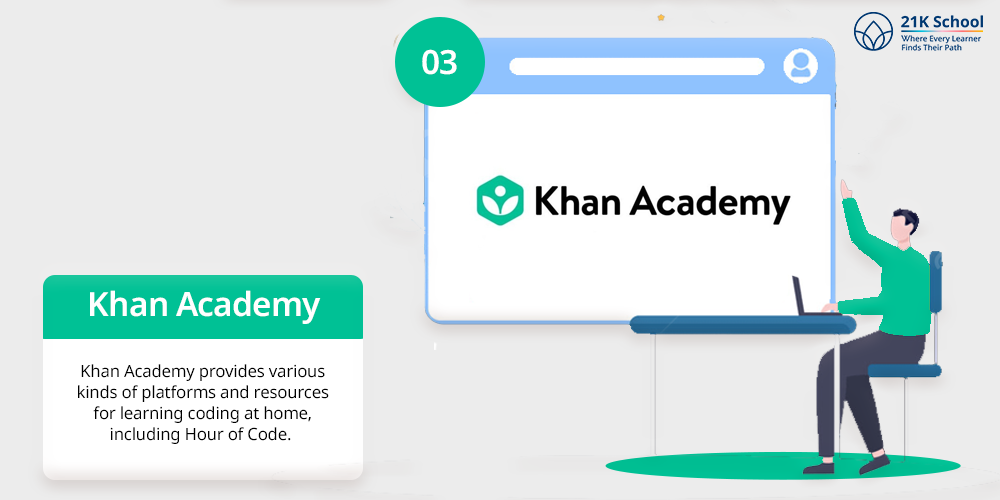
Khan Academy provides various kinds of platforms and resources for learning coding at home, including Hour of Code.
It provides introductory computer programming courses especially to uplift 21st century skills.
Platform like Khan Academy is great for visual kids thanks to its engaging animations and practical exercises.
4. W3Schools
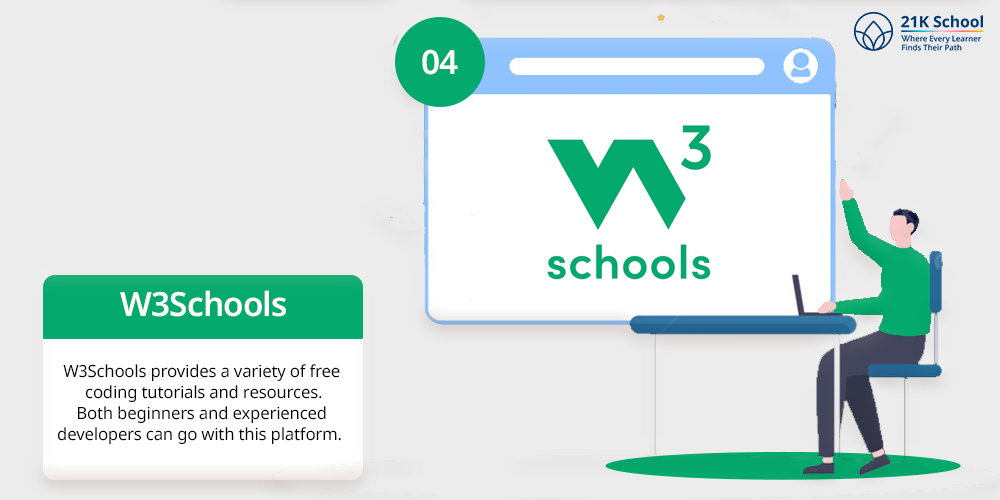
W3Schools provides a variety of free coding tutorials and resources. Both beginners and experienced developers can go with this platform.
Web development, programming languages, and other related technologies are some of the popular courses available in W3Schools. It is one of the best coding websites for kids.
5. Udemy
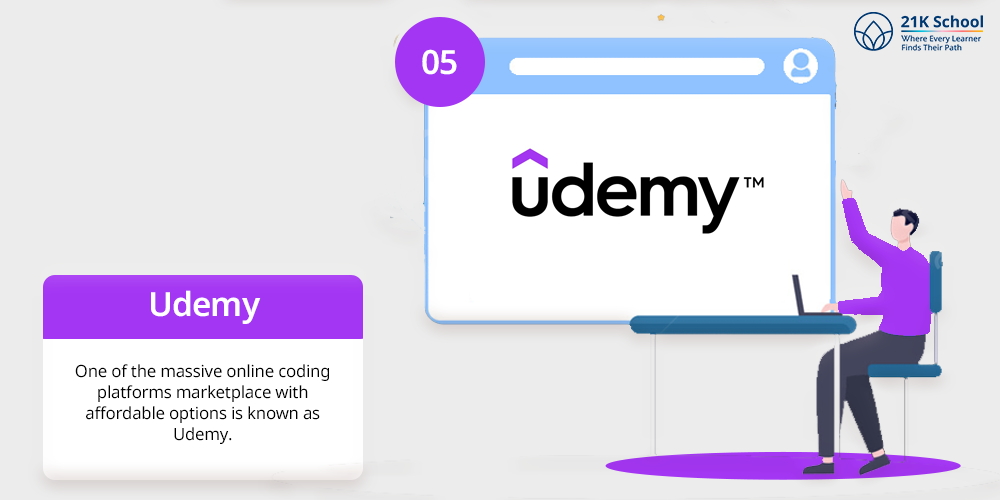
One of the massive online coding platforms marketplace with affordable options is known as Udemy. It offers nearly every programming language and technology stack.
The courses it provide consist of hours of video content, downloadable resources, and lifetime access
6. Sololearn
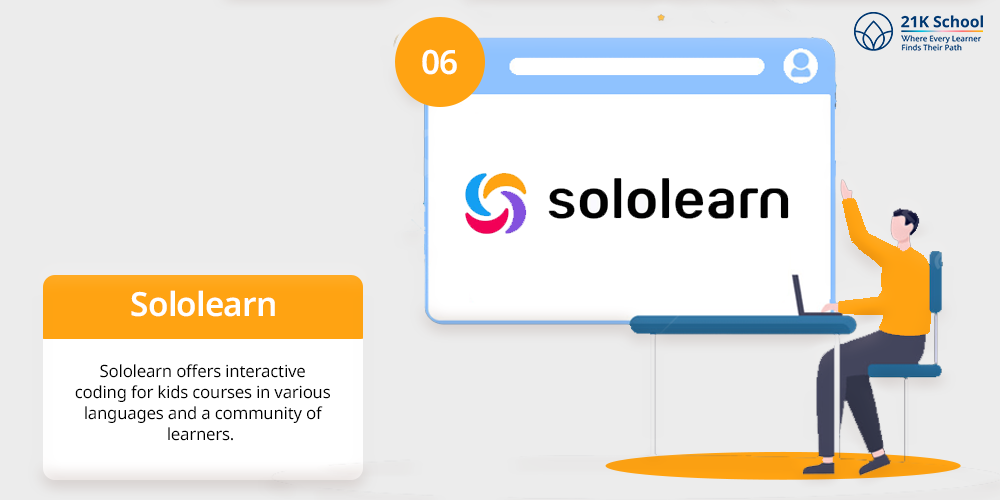
Sololearn offers interactive coding for kids courses in various languages and a community of learners.
It helps kids to break down programming concepts into small size lessons and quizzes. It’s ideal for those looking to get started quickly and practice consistently.
7. Code.org
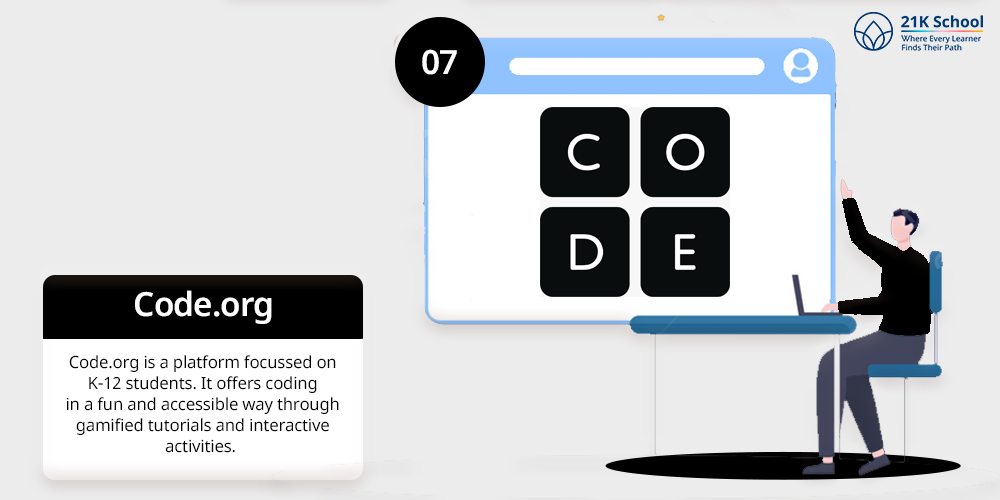
Code.org is a platform focussed on K-12 students. It offers coding in a fun and accessible way through gamified tutorials and interactive activities.
It is great to start, especially for younger students who are about to start coding.
How to Learn Coding at Home?
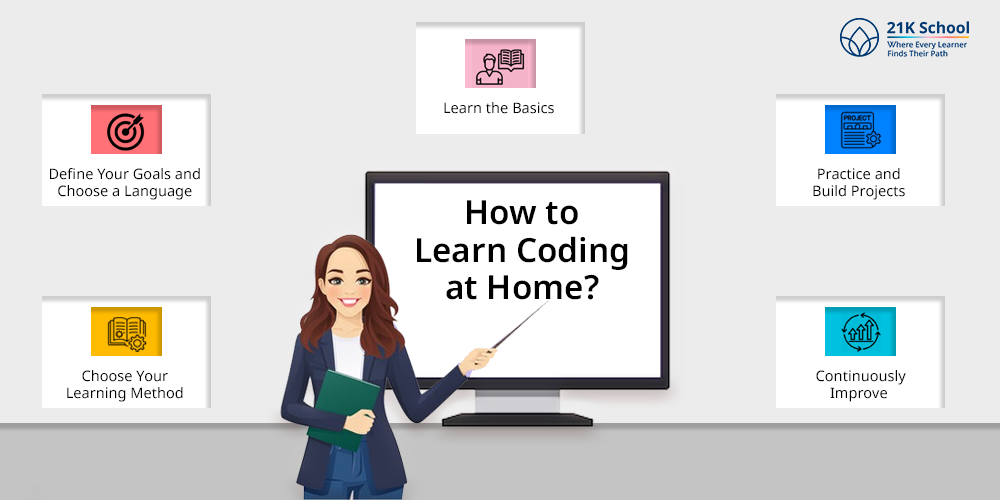
Learning coding is the need of 21st century growth and development. Children understand how to improve critical thinking skills and complex problem solving techniques.
Kids who want to learn coding in an effective manner can go with the following steps of how to learn coding at home.
1. Choose Your Learning Method
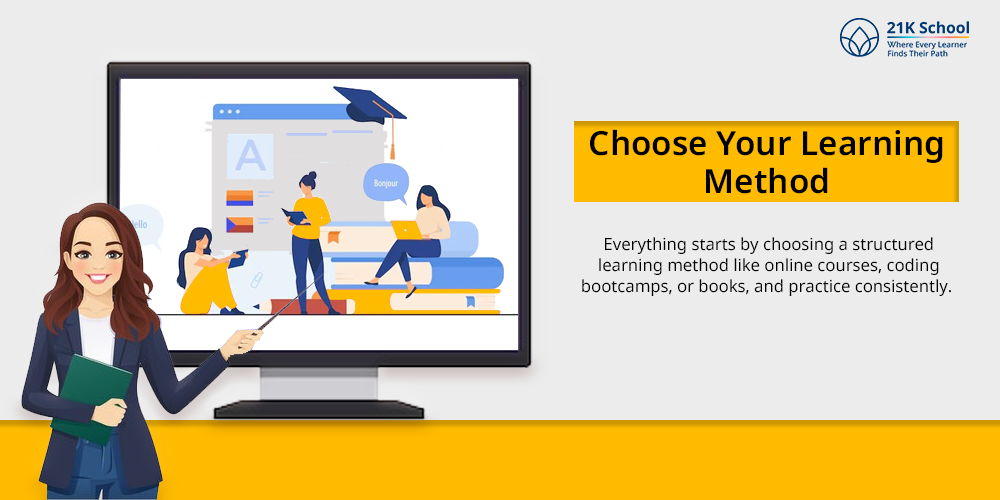
Everything starts by choosing a structured learning method like online courses, coding bootcamps, or books, and practice consistently.
- Online Courses: Various platforms provide online courses for coding such as course, edx, Codecademy, Udemy etc.
- Free Resources: Kids can also learn from some popular free resources of coding like Khan Academy, freeCodeCamp, and W3Schools. Understand each programming through free tutorials.
- Books and eBooks: Books and ebooks are a valuable source of learning where kids can learn each step accurately with examples. One can read multiple times for better understanding.
- YouTube: In this digital world technology reaches to each home, one of the popular examples is YouTube. It has free online videos by professional coders. Now you can learn everything from basic to advanced.
2. Define Your Goals and Choose a Language
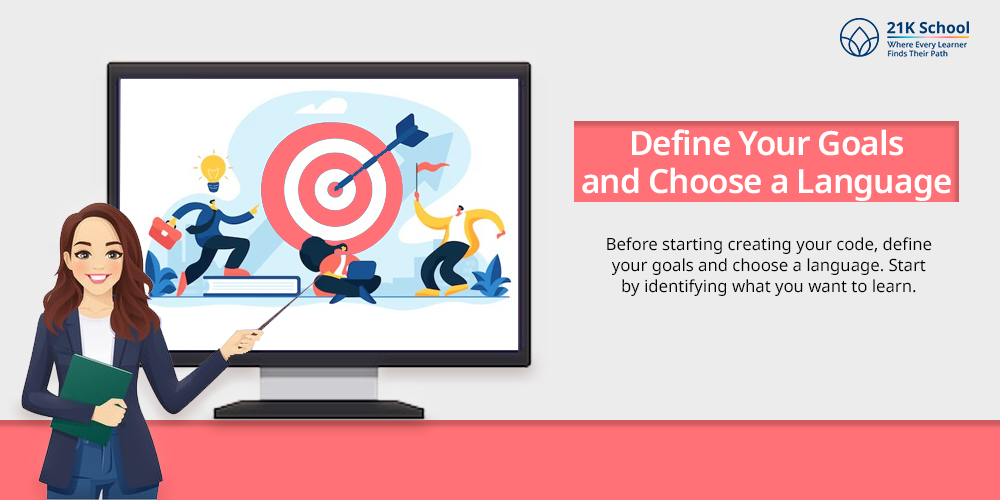
Before starting creating your code, define your goals and choose a language. Start by identifying what you want to learn.
Think about your interests, career aspirations, and the kinds of projects you enjoy working on. When selecting a coding language as a beginner start with Python, JavaScript, C++ etc.
3. Learn the Basics
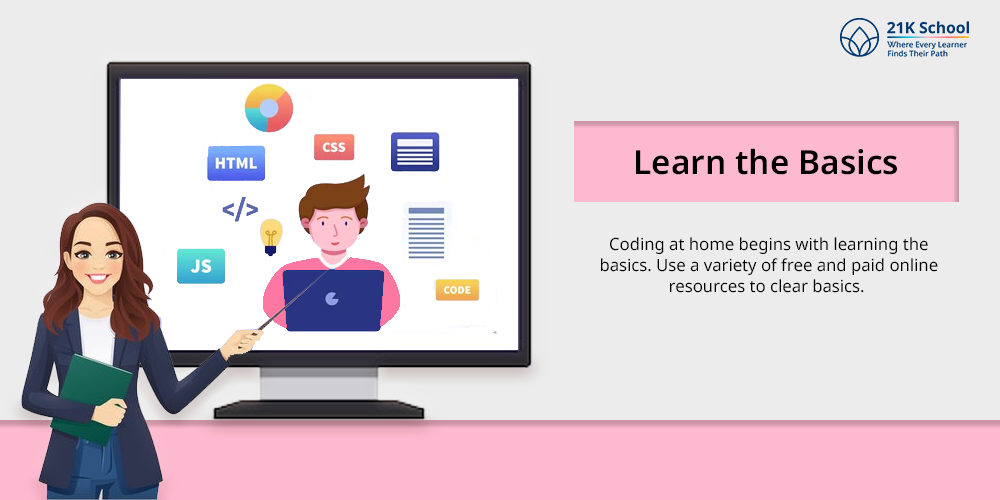
Coding at home begins with learning the basics. Use a variety of free and paid online resources to clear basics.
Practice with interactive coding platforms, and build projects to reinforce your learning. Start with foundational concepts:
- Variables and data types
- Loops and conditionals
- Functions and objects
- Arrays and lists
- Input/output operations
Don’t rush, clearing the basics is a foundation and most important part of learning coding as a beginner.
4. Practice and Build Projects
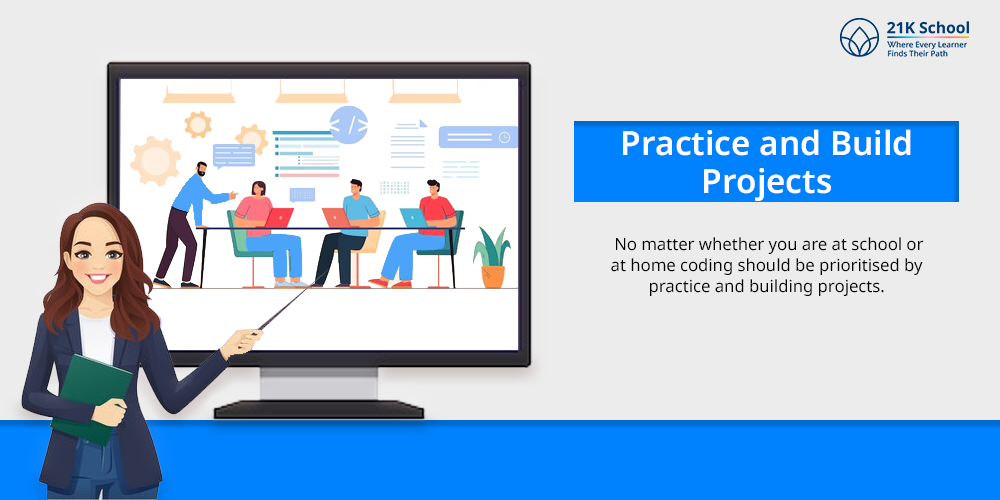
No matter whether you are at school or at home coding should be prioritised by practice and building projects.
Kids can create projects like a simple calculator, to-do list, or even a web scraper. Also regular practice of 30 min to 1 hour makes a difference.
5. Continuously Improve
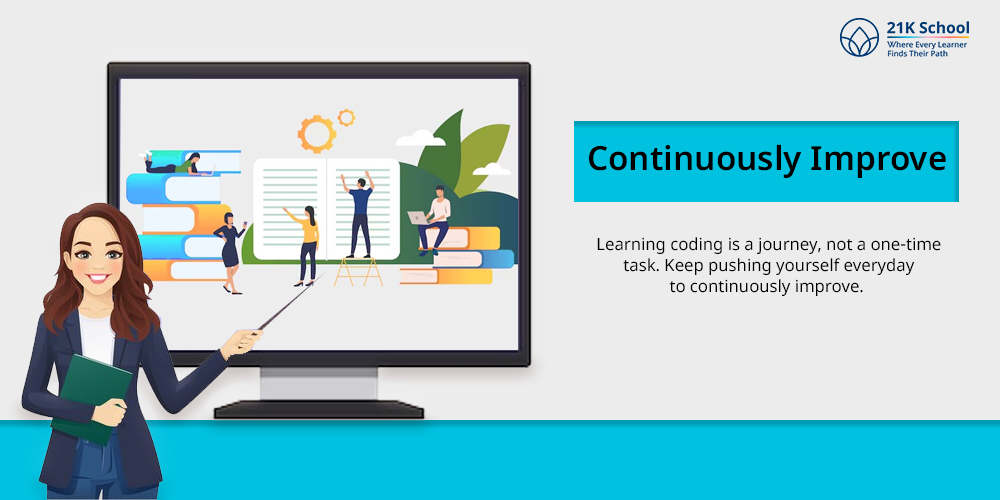
Learning coding is a journey, not a one-time task. Keep pushing yourself everyday to continuously improve.
Start with solving coding challenges, read documentation, join communities like Stack Overflow, stay updated on new tools and trends. Also collaborate with peers for improvements.
Benefits to Learn Coding from Home
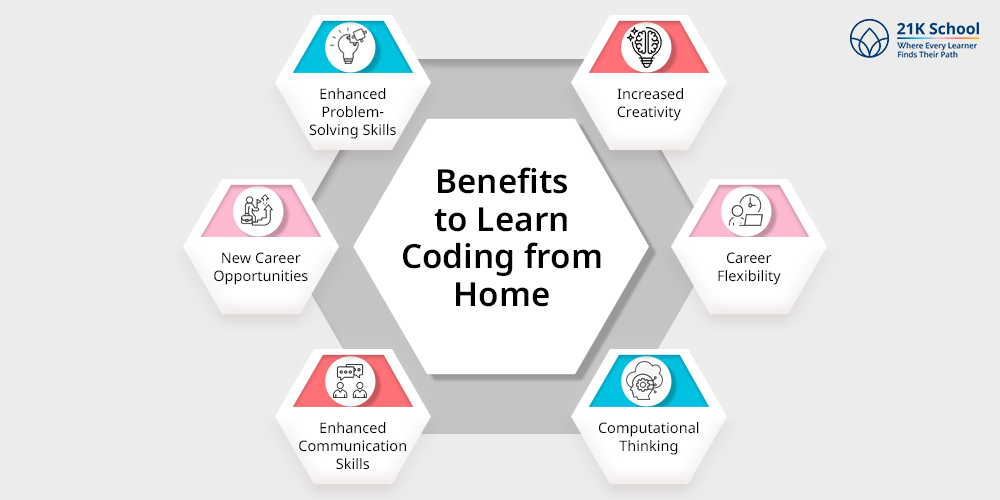
There are many benefits to learning coding from home. From enhancing problem-solving skills to opening new career paths. Before starting, remember to read the benefits of coding lessons for kids.
To improve your skills also read how to improve problem solving skills.
Here ia an detailed information of benefits:
1. Enhanced Problem-Solving Skills
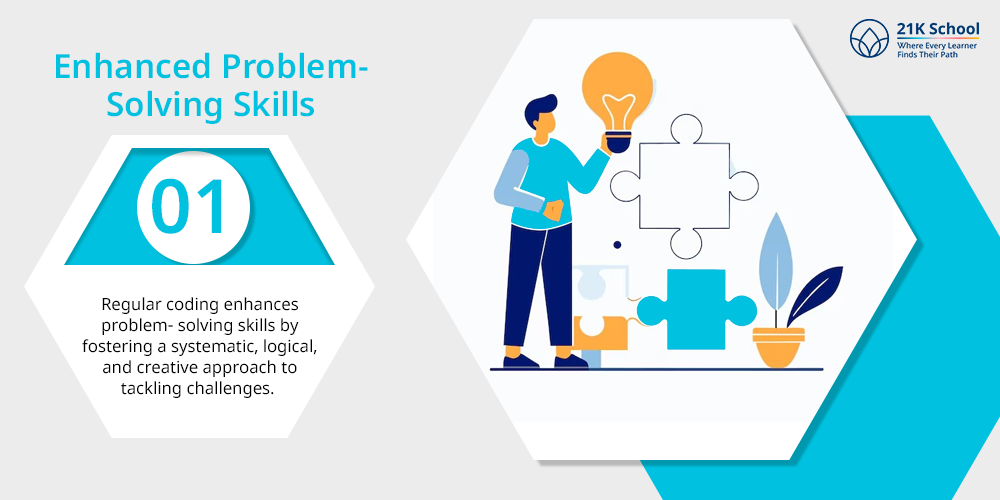
Regular coding enhances problem-solving skills by fostering a systematic, logical, and creative approach to tackling challenges.
It helps in breaking down complex problems into smaller and simple solutions and improving critical thinking.
To improve your critical thinking skills one must read critical thinking activities for kids.
2. Increased Creativity
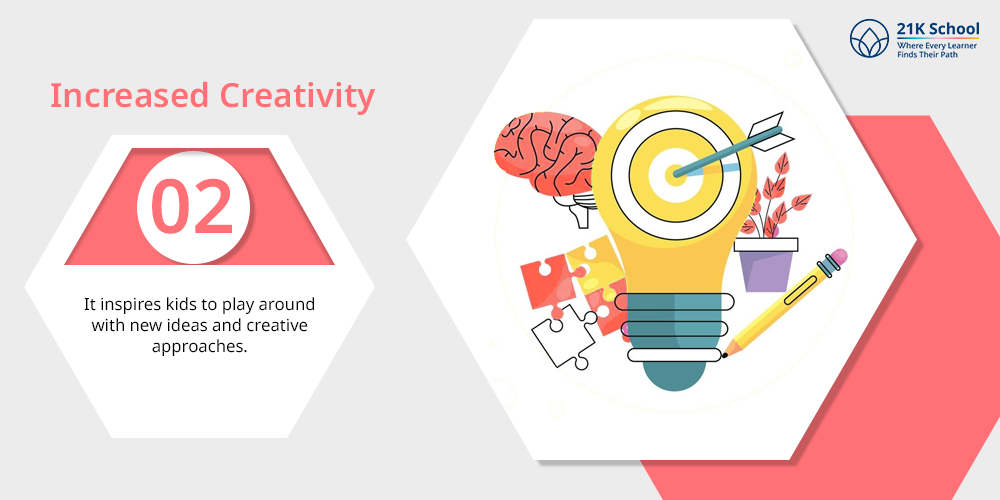
One of the most significant benefits of coding is increased creativity. It inspires kids to play around with new ideas and creative approaches.
It helps kids to turn the ideas into real, interactive digital products.
3. Career Flexibility
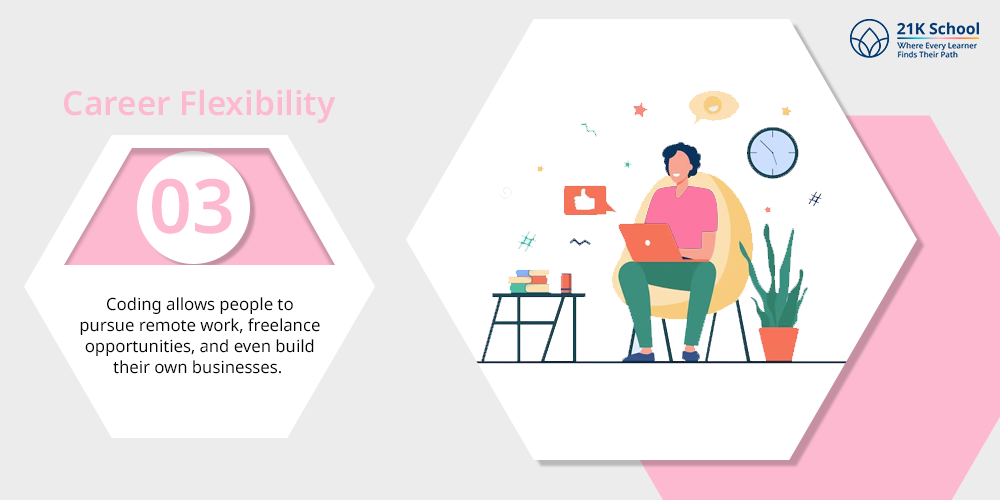
Coding allows people to pursue remote work, freelance opportunities, and even build their own businesses.
It offers career flexibility and open doors in various industries.
4. Computational Thinking
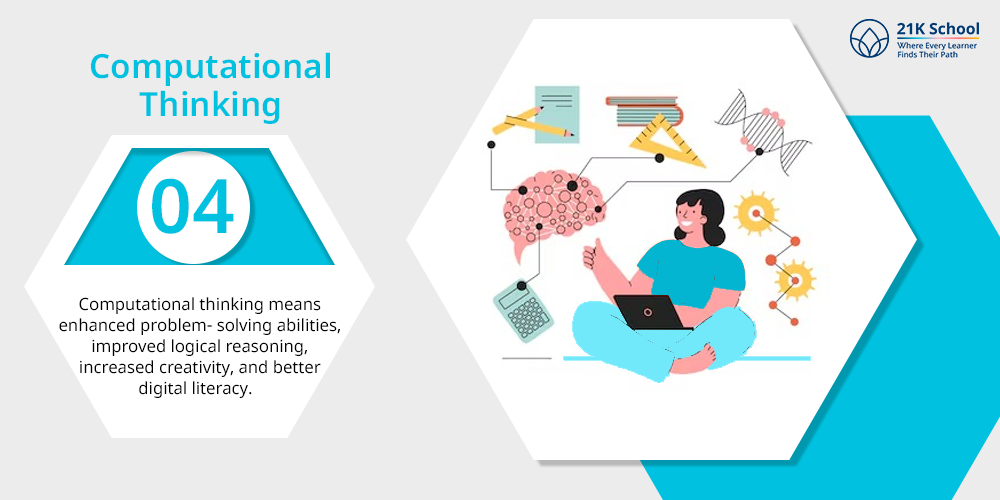
Computational thinking means enhanced problem-solving abilities, improved logical reasoning, increased creativity, and better digital literacy.
This analytics mindset is crucial to get success in the 21st century.
5. Enhanced Communication Skills
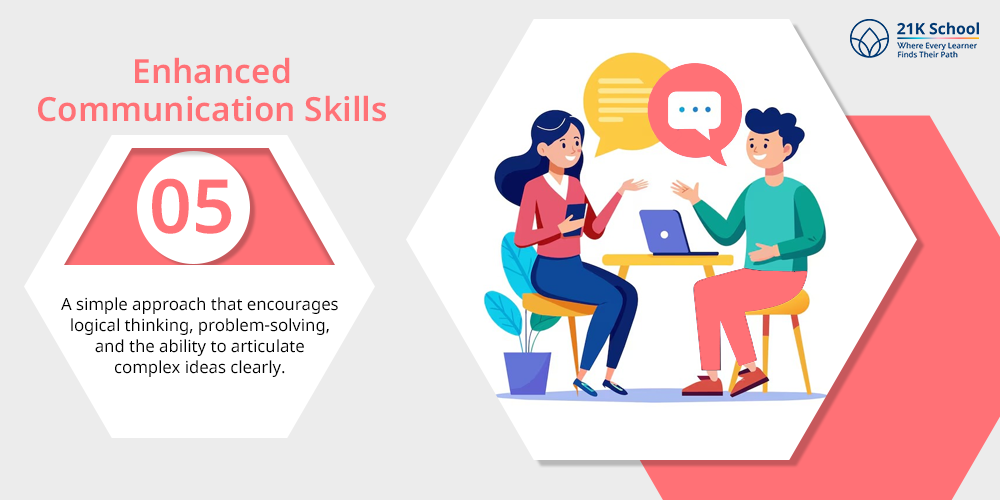
Coding improves communication skills by a simple approach that encourages logical thinking, problem-solving, and the ability to articulate complex ideas clearly.
6. New Career Opportunities
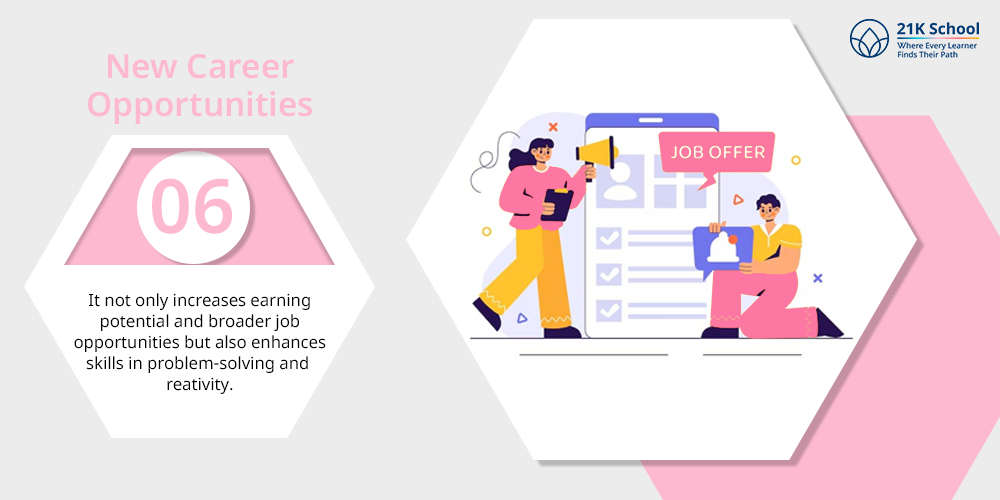
One of the crucial benefits of coding is emerging new career opportunities.
It not only increases earning potential and broader job opportunities but also enhances skills in problem-solving and creativity.
Challenges To Learn Coding At Home
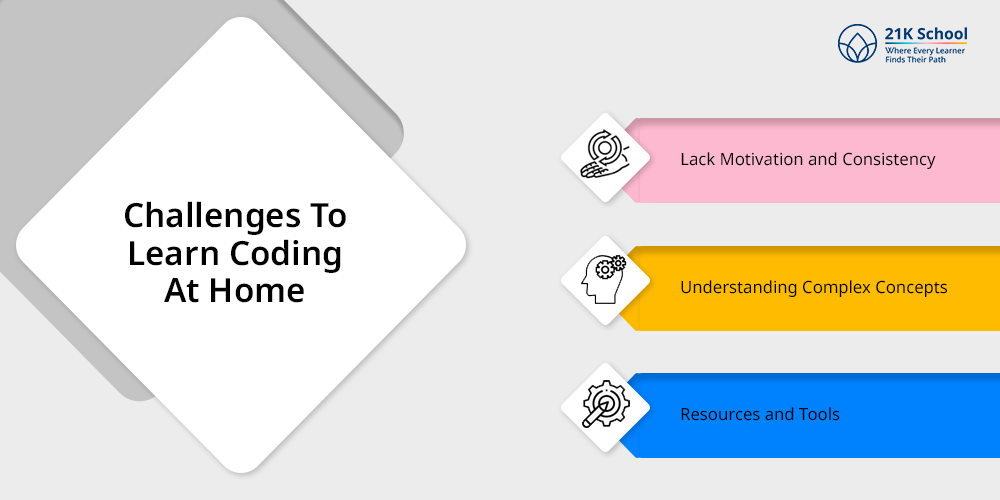
Learning coding at home has numerous challenges faced by kids. Some common challenges are finding motivation, understanding complex concepts, debugging errors etc.
Also read: Types of Errors in Programming
Is coding hard for kids? Here’s elaboration of challenges of coding:
1. Lack Motivation and Consistency
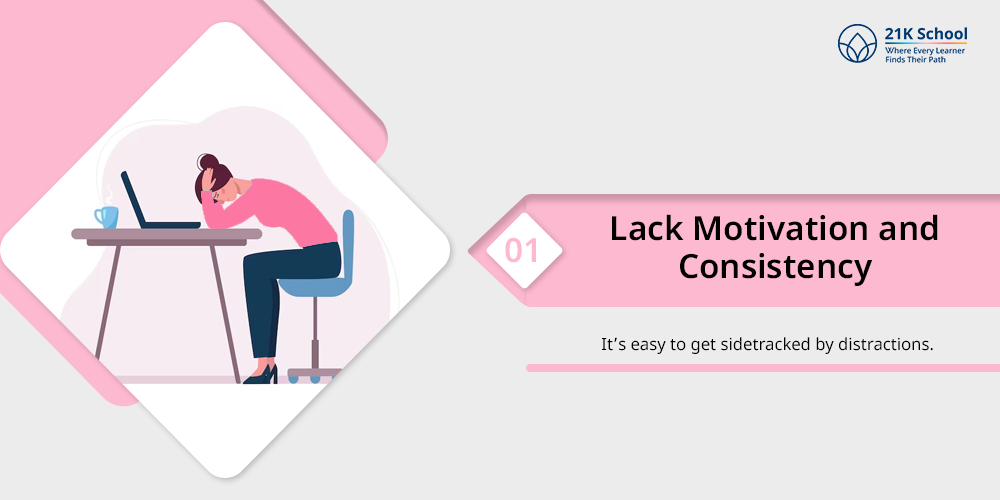
While learning how to code kids sometimes lack the motivation and consistency. It’s easy to get sidetracked by distractions.
However, by establishing a clear learning schedule, break down projects into manageable tasks, and find a coding buddy or community for support.
2. Understanding Complex Concepts
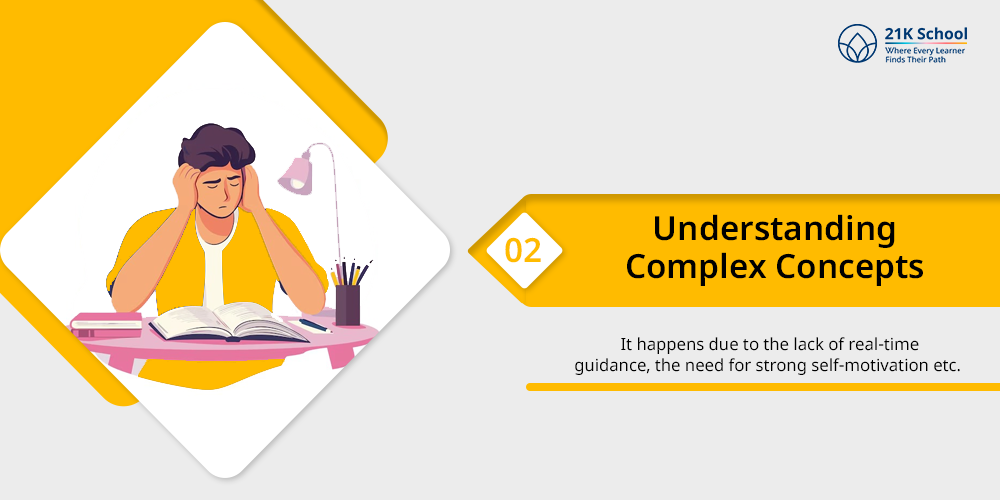
Challenges such as difficulties in understanding complex concepts are common. It happens due to the lack of real-time guidance, the need for strong self-motivation etc.
To overcome this, explore online courses, tutorials, and documentation to learn complex concepts.
3. Resources and Tools
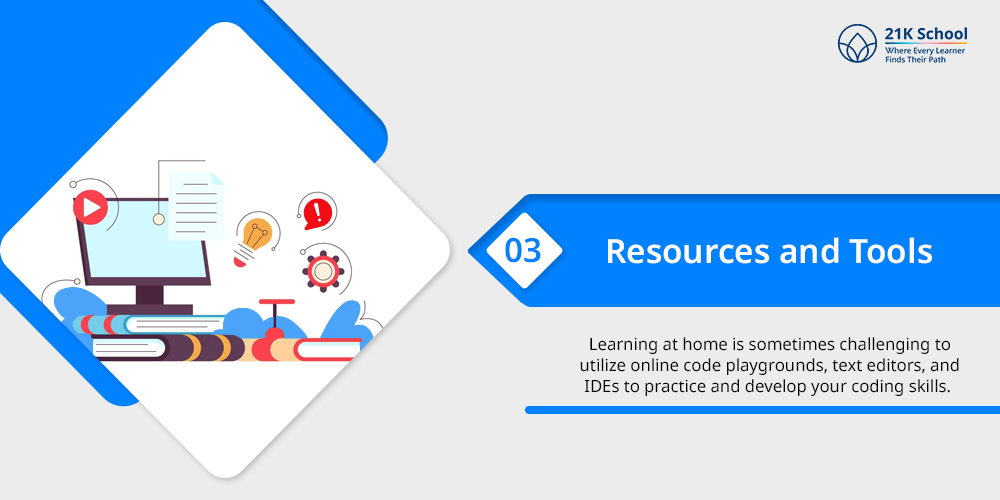
Learning at home is sometimes challenging to utilize online code playgrounds, text editors, and IDEs to practice and develop your coding skills.
Kids can take the help of free virtual learning platforms like Codecademy and Khan Academy as beginners practice.
Popular Coding Languages Students Can Learn At Home
Kids who are interested in learning coding at home can start with simple programming languages. Here’s a more detailed points of each language:
| S.No. | Language | Best For | Why It’s Good for Beginners |
| 1. | Python | It is ideal for data science, automation, and AI. | Simple syntax, versatile. |
| 2. | JavaScript | Web development can be done through JavaScript. | Runs in browsers, huge community. |
| 3. | HTML/CSS | It is best for website structure and design. | Easy to start, visual results. |
| 4. | Java | Development of android apps, enterprise software. | OOP-based, widely used. |
| 5. | C# | Ideal for game development. | Strong in games, structured language. |
Future of Coding: Career Prospective
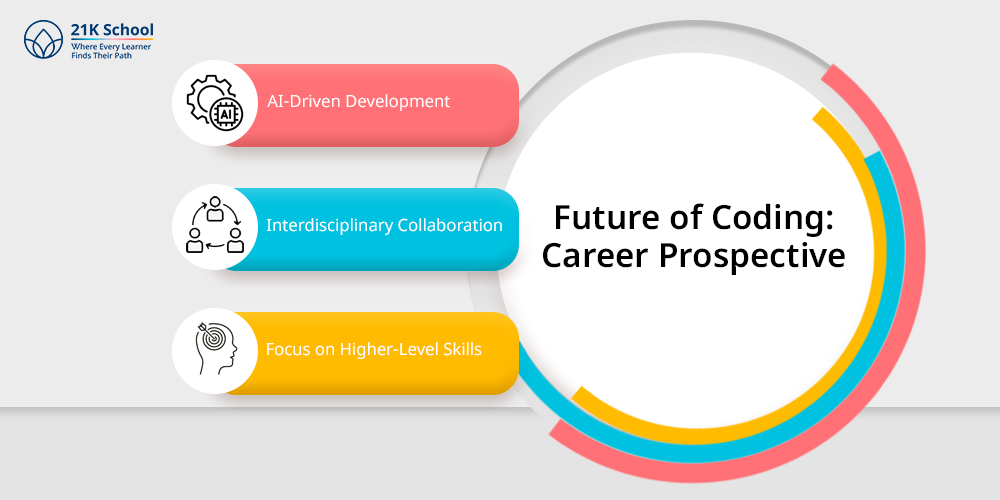
The future of coding offers kids new career opportunities and growth. With increasing demand for skilled coders continuing in the 21st century make it a more prominent career option.
With time traditional coding evolved and to match the new technological and educational changes kids need to familiar with the future of programming languages.
The future of coding promises a dynamic landscape where AI tools will augment human capabilities, leading to new roles and evolving job responsibilities.
Remember the key to success is evolving with upcoming technology. Key career prospects in the future of coding are:
1. AI-Driven Development
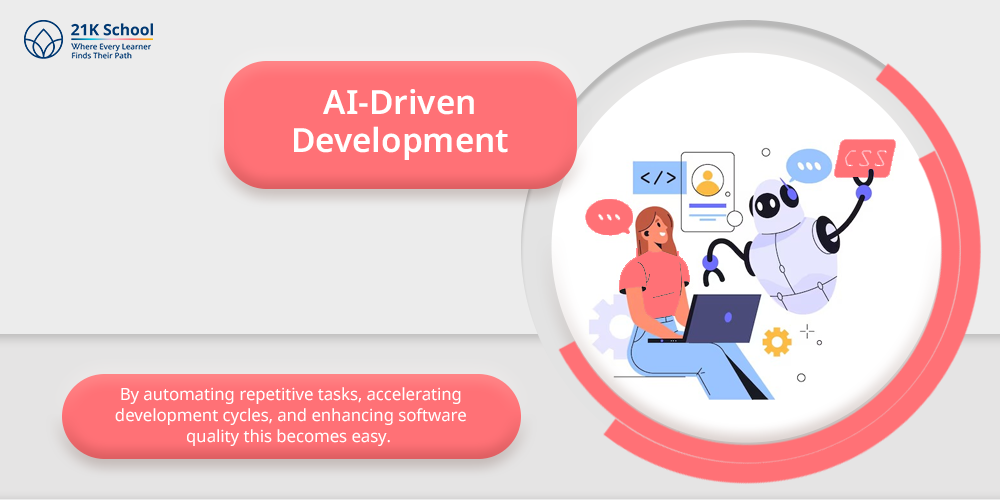
AI is increasingly shaping the future of coding in today’s era. By automating repetitive tasks, accelerating development cycles, and enhancing software quality this becomes easy.
AI can impact code generation, performance optimization, collaboration and communication.
2. Interdisciplinary Collaboration
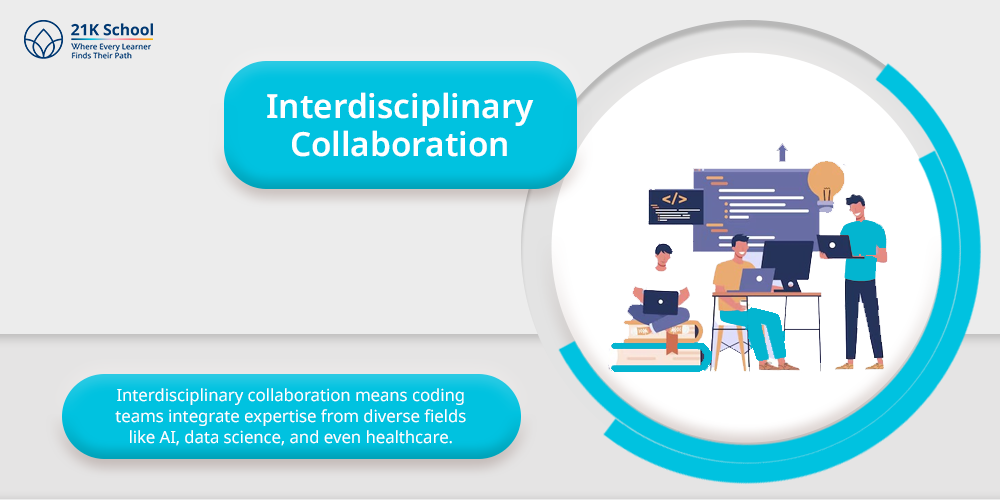
Interdisciplinary collaboration means coding teams integrate expertise from diverse fields like AI, data science, and even healthcare.
It is crucial for the future of coding because it addresses complex problems, enhancing innovation, leveraging AI and machine learning.
3. Focus on Higher-Level Skills
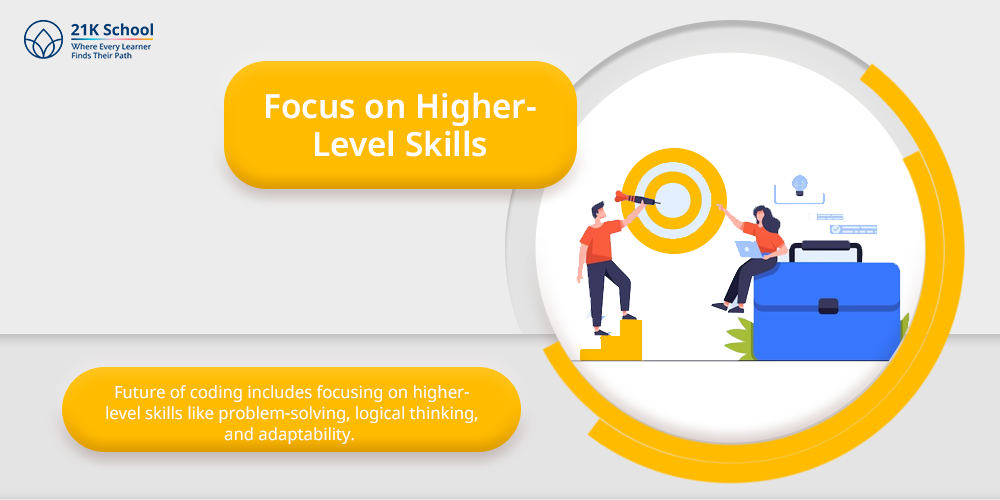
Future of coding includes focusing on higher-level skills like problem-solving, logical thinking, and adaptability.
This means focusing on understanding core programming principles and learning how to use AI tools, rather than simply becoming proficient in specific coding languages.
Conclusion
Learning coding or programming at home is an ideal decision for kids in today’s era. It doesn’t require expensive degrees or fancy equipment to become coder.
With some curiosity, commitment, and consistency and the right resources and mindset, you can unlock a world of opportunities from your personal settings.
Start with a basic understanding and learn advanced levels of coding. Build something amazing to bring yourself to the limelight.
Every expert in coding began with zero experience. Learn how to improve your coding skills in the 21st century.
